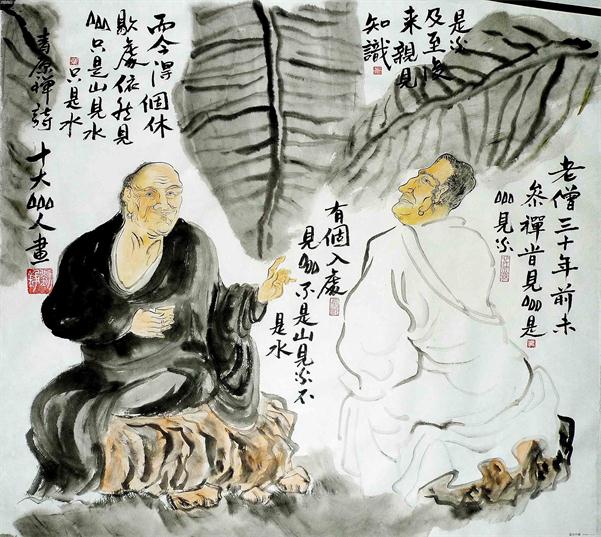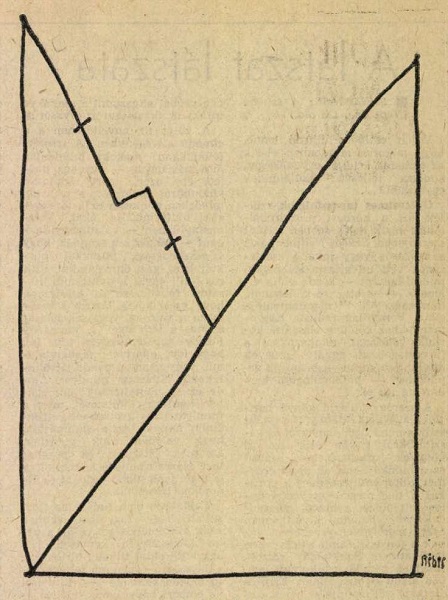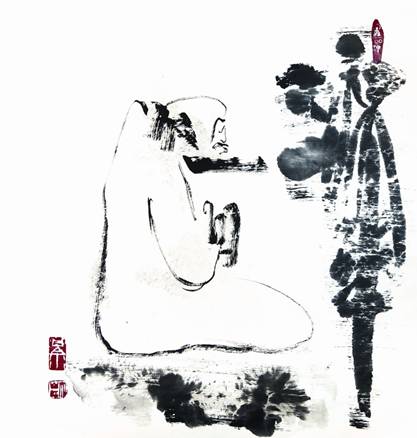Mountains as the Mountain Again River as the River Zen
ZEN IRODALOM ZEN LITERATURE
« Zen főoldal
« vissza a Terebess Online nyitólapjára

青原惟信 Qingyuan Weixin (9th cent.)
( Rōmaji :) Seigen Ishin
| | |
| Csing-jüan Vej-hszin mondásaiból Fordította: Terebess Gábor | English versions, 1926-2012 |
Qingyuan declared that there were three stages in his understanding of the dharma: the outset phase, seeing mountain as mountain and h2o every bit h2o; the 2d stage, seeing mountain non as mount and h2o not every bit water; and the 3rd phase, seeing mountain nonetheless as mountain and h2o still every bit water.
(Xu Chuandenglu 續傳燈錄, T no.2077, 51:614b-c.)
![]()
D.T. Suzuki (1926)
According to Seigen Ishin (Ch'ing-yüan Wei-hsin):
"Before a human being studies Zen, to him mountains are mountains and waters are waters; after he gets an insight into the truth of Zen through the educational activity of a practiced master, mountains to him are not mountains and waters are non waters; but later on this when he really attains to the dwelling house of rest, mountains are over again mountains and waters are waters."
(D. T. Suzuki, Essays in Zen Buddhism, First Serial, 1926, London; New York: Published for the Buddhist Society, London by Rider, p. 24.)
Alan Watts (1951)
The famous maxim of Ch'ing-yüan Wei-hsin [Seigen Ishin]
Before I had studied Zen for xxx years, I saw mountains as mountains, and waters as waters. When I arrived at a more intimate cognition, I came to the point where I saw that mountains are not mountains, and waters are not waters. Simply at present that I have got its very substance I am at rest. For it'due south just that I see mountains once again every bit mountains, and waters once over again as waters. [13]
[thirteen] Ch'uan Teng Lu, 22.
老僧三十年前未參 禪時、見山是山、見水是水、及至後 夾 親見知識、有箇入處、見山不是山、見水不是水、而今得箇體歇處、依然見山 秪 是 山、見水 秪 是水(Alan Watts, The Fashion of Zen, New York, Pantheon Books, 1951, p. 126, 220 one thousand)

Donovan Leitch (1967)
The 1967 psychedelic stone vocal of Donovan Leitch, "At that place Is a Mount," with the lyrics, "First there is a mount, then there is no mountain, and then there is." https://www.youtube.com/watch?5=XcMM5-zBCEc
There Is A Mountain Song Lyrics
The lock upon my garden gate`s a snail, that`s what information technology is.
The lock upon my garden gate`s a snail, that`s what it is.
First at that place is a mountain, and then there is no mountain, then there is.
First in that location is a mount, and then at that place is no mountain, and then there is.
The caterpillar sheds his pare to discover a butterfly within.
Caterpillar sheds his skin to find a butterfly within.
Outset there is a mountain, then there is no mountain, then there is.
First there is a mountain, then there is no mountain.
Oh Juanita, oh Juanita, oh Juanita, I telephone call your name.
Oh, the snow will be a blinding sight to come across every bit it lies on yonder hillside.
The lock upon my garden gate`s a snail, that`southward what information technology is.
The lock upon my garden gate`s a snail, that`southward what it is.
Caterpillar sheds his peel to find a butterfly within.
Caterpillar sheds his skin to find a butterfly within.
Ah, my-my.
Start there is a mountain, then there is no mountain, and then there is.
Beginning there is a mountain, then in that location is no mountain, then there is.
First there is a mount, then there is no mountain, and then at that place is.
First there is a mount, so there is no mount, then in that location is.
First there is a mountain

Van hegy
Kertkapum retesze csiga bizony.*
Kertkapum retesze csiga bizony.
Először van hegy, aztán nincs hegy, aztán van.
Először van hegy, aztán nincs hegy, aztán van.
A hernyó vedlett bőrében pillangó.
Hernyó vedlett bőrében pillangó.
Először van hegy, aztán nincs hegy, aztán van.
Először van hegy, aztán nincs hegy.
Ó Juanita, Ó Juanita, Ó Juanita, egyre hívlak.
Ó, vakító hótakaró távolban a domboldalon.
Kertkapum retesze csiga bizony.
Kertkapum retesze csiga bizony.
Hernyó vedlett bőrében pillangó.
Hernyó vedlett bőrében pillangó.
Ah, az én, az én
Először van hegy, aztán nincs hegy, aztán van.
Először van hegy, aztán nincs hegy, aztán van.
Először van hegy, aztán nincs hegy, aztán van.
Először van hegy, aztán nincs hegy, aztán van.
Először van hegy*Vö. 小林一茶 (Kobayashi Issa, 1763-1828) haikujával:
柴門や錠のかはりのかたつぶり
shiba no to ya jō no kawari no katatsuburi (1815)sövénykapumra
került végre retesz is
egy kerti csiga(Terebess Gábor fordítása)
Fritjof Capra (1975)
To regain the naturalness of our original nature requires long preparation and constitutes a keen spiritual accomplishment. In the words of a famous Zen proverb,
Before y'all study Zen,
mountains are mountains and rivers are rivers;
while you are studying Zen,
mountains are no longer mountains and rivers are no longer rivers;
but in one case y'all have had enlightenment
mountains are once again mountains and rivers once again rivers.(The Tao of Physics by Fritjof Capra, first published in 1975, London: Wildwood Business firm, New York: Bantam Books, p. 126)
Abe Masao 阿部正雄 (1983)
Thirty years ago, earlier I began the written report of Zen, I said, "Mountains are mountains, waters are waters." After I got an insight into the truth of Zen through the instruction of a skilful master, I said, "Mountains are not mountains, waters are not waters." Merely now, having attained the abode of final residual [i.e., Awakening], I say, "Mountains are really mountains, waters are really waters."
(Ch'ing-yuan Wei-hsin. Quoted by Masao Abe: "God, Emptiness, and Ideals"; Buddhist-Christian Studies, Vol. 3. (1983), pp. 53-sixty. [p.56])
The post-obit soapbox given past the Chinese Zen master Ch'ing-yuan Wei-hsin (Ja: Seigen Ishin) of the T'ang dynasty provides a cardinal by which we may approach Zen philosophy. His discourse reads as follows:Xxx years ago, before I began the written report of Zen, I said, 'Mountains are mountains, waters are waters.' Afterwards I got an insight into the truth of Zen through the instruction of a proficient primary, I said, 'Mountains are not mountains, waters are not waters.' Merely afterward having attained the abode of concluding rest [that is, Awakening], I say, 'Mountains are really mountains, waters are really waters.'
And and so he asks, 'Do yous think these 3 understandings are the same or different?(Abe Masao. Zen and Western Idea. Edited past William R. LaFleur. Honolulu: University of Hawaii Printing, 1985, p. 4.)
Urs App (1994)
The passage in question is from the Compendium of the Five Lamps (Wudeng huiyuan), in the Zokuzoukyou, 138: 335a line 9 ff. Master Qingyuan made the statement. A translation, in Urs App'due south _Master Yunmen_, pp. 111-12, note 2 reads:
"Thirty years ago, earlier I proficient Chan, I saw that mountains are mountains and rivers are rivers. However, after having accomplished intimate noesis and having gotten a fashion in, I saw that mountains are not mountains and rivers are not rivers. But now that I have plant rest, every bit before I see mountains every bit mountains and rivers equally rivers."
PDF: Master Yunmen : from the record of the Chan Master "Gate of the Clouds"
translated, edited, and with an introduction by Urs App, New York : Kodansha International, 1994. 252 p.
Nonin Chowaney (2012)
Rev. Nonin Chowaney
Soto Zen Buddhist Priest. Transmitted Dharma Heir of Dainin Katagiri Roshi.
Abbot and Head Teacher, Nebraska Zen Center / Heartland Temple, Omaha, Nebraska, U.s.a.
http://www.zenforuminternational.org/viewtopic.php?f=17&t=8382Starting time seeing mountains equally mountains and rivers as rivers ways seeing them as stock-still and solid entities in and of themselves.
Later seeing them every bit non mountains and not rivers ways we understand that neither mountains nor rivers exist in and of themselves, that they are empty of inherent existence and made upward of other beings that are also empty of inherent existence. For instance, there is nothing within a mountain that we can pull out and say, "this is mount," or, "this is what makes a mount a mountain." Mountains are made upwards of rocks, copse, grass, snow, water, rivers, ponds, lakes, insects, birds, animals, etc., etc., etc., and all of these things are fabricated up of other things. And so, there are no mountains and no rivers.
When we continue to practice, and our wisdom eye is fully opened, we realize that mountains are indeed mountains, and rivers are indeed rivers, for there is a mountain there and a river over here. Withal, we deeply empathise that both "mountain" and "river" are simply words that we use to describe the conditioned phenomena in front end of us. Neither phenomena is a fixed nor permanent entity that exists in and of itself and possesses inherent being as "mountain," or "river." In other words we experience and empathize their true nature, and the true nature of all beings.
![]()
Csing-jüan Vej-hszin mondásaiból
Fordította: Terebess Gábor
Folyik a híd, Officina Nova, Budapest, 1990, 79. oldal
Csing-jüan mondta:
– Harminc éven át tanulmányoztam a csant. Eleinte a hegyek hegyek voltak, a vizek vizek. Ahogy jobban elmélyültem, a hegyek megszűntek hegyek, a vizek megszűntek vizek lenni. De nigh, hogy a végére jutottam, a hegyek újra hegyek, a vizek újra vizek.

Réber László rajza (Élet és Irodalom, 1984. január 13., 9. oldal)D.T. Suzuki-anekdota John Muzzle: A csend c. könyvéből (Erős László Antal fordítása):
„ A zen tanulmányozása előtt az emberek emberek, a hegyek pedig hegyek. A zen tanulmányozása közben a dolgok összezavarodnak. A zen tanulmányozása után az emberek emberek, a hegyek pedig hegyek. Miután ezt elmondta, dr. Suzukinak feltették a kérdést: - Mi a különbség az előtte és az utána között? - Nincs semmi különbség, csak a lábak kissé elemelkednek a földtől. "

甘泉 Gan Quan illusztrációja (2013)
.
Source: https://terebess.hu/zen/qingyuan.html
0 Response to "Mountains as the Mountain Again River as the River Zen"
Post a Comment